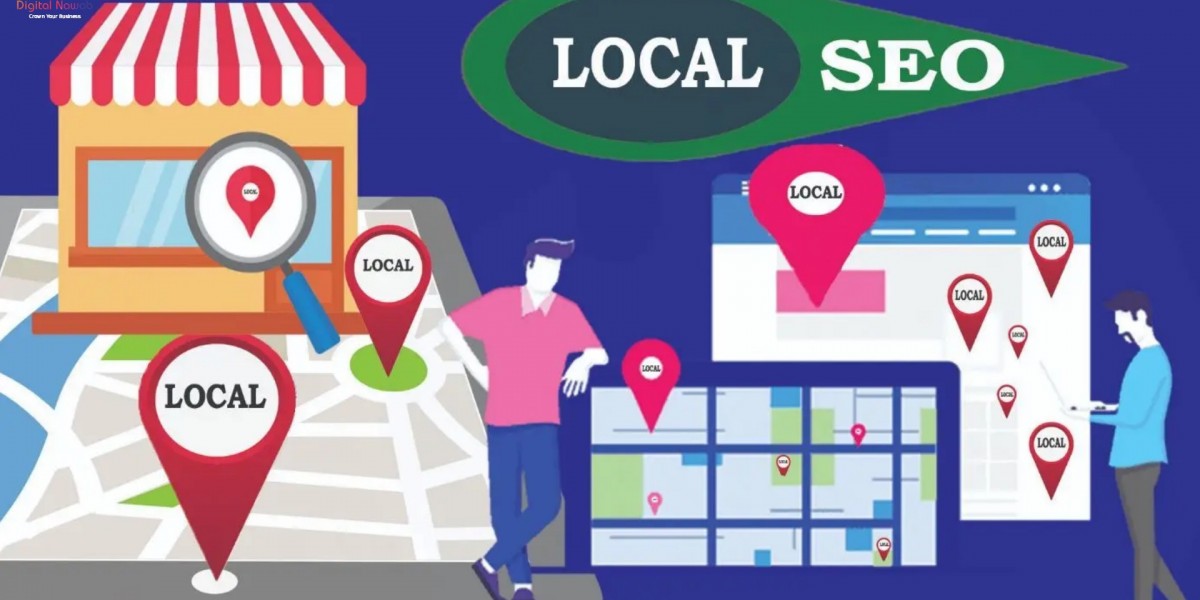This implies that if you run a local business and your local SEO isn't in order, you're losing out on business every time a local user looks for your goods or services online.
If you're having trouble with that, I've put together a list of local SEO pointers for you here so you can attract more attention in your neighbourhood.
Digital Nawab is a digital marketing agency in Lucknow who helps businesses to grow their brand awareness, expand their customer base, increase sales and increase conversions through effective digital advertising.
How Does Local SEO Work?
By using local SEO, local companies can become more visible online. Similar to organic SEO, it calls for more attention to geography.
You wish to rank well in search engine result pages (SERPs) for local searches in particular.
A New York restaurant has no incentive to appear prominently in Houston's local search results. They want to be discovered in New York.
In order to enhance your organic local traffic, it is crucial to improve your local SEO.
The local SEO study from Safari Digital states that the signals from the Google Business Profile, such as the keywords and backlink profile, are the most important ranking determinants.
How do you get there then?
The following steps can help you improve your local SEO:
- Make a page for contacts.
- On mobile devices, enable clickable phone numbers.
- On your website, include a map.
- On your website, include endorsements.
- On your website, use schema.
- Make sure to optimise your Google My Business profile.
- Claim your social media accounts.
- Make localised material, such as a calendar of events.
- Make obtaining more customer reviews a priority.
- Create citations in blogs, directories, and local search engines.
Don't worry; we'll go into greater depth about these measures as well as a few other local SEO suggestions below.
Make your website local SEO-ready.
The creation of a website that is properly optimised is a fundamental initial step in our local SEO approach. It will be quite difficult for you to get up the SERPs if your website isn't properly optimised.
Now is the time to check your website's SEO and determine where it needs work.
In addition to following general SEO recommended practises, you must take the following actions for local SEO:
Conduct a local SEO audit.
You have a presence in business directories now, so it's time to comprehend the environment. By doing this, you may observe what your rivals are doing and enhance your website in the same way (if not better).
The most knowledge and inspiration can be found on the first page of SERP results. After all, 66.5 percent of SERP click-throughs are accounted for by the top three listings alone!
Consider using free tools and analyzers like the SEO Analyzer as you start your audit. These tools give you a thorough breakdown of the present state of your website and what you can change to improve it.
I advise keeping a spreadsheet with your conclusions so you can simply track and apply your modifications.
Select powerful local keywords
Targeting powerful local keywords that address a variety of users' search intent is another obvious local SEO recommendation.
Choosing the right keywords might be challenging for small businesses. When you target high-volume keywords, you know you'll be lost in the crowd, but lower-volume keywords typically produce meagre results.
Establish a Specific Contact Page
People now demand more specific information about your company.
Make sure your "NAP:" is prominently displayed on your contact page.
- Name
- Address
- Phone
Include All Your Business Addresses
Include each location's full name, address, and phone number in the sitewide footer element on your website if you have fewer than ten locations.
To make it even easier for their audience to discover them, one Seattle coffee business dedicates a whole page on their website to presenting each of their locations, complete with addresses, images, and operating hours.
Make sure your website is mobile-friendly.
You can't afford to not have a mobile-friendly site, given that 82 percent of smartphone users complete "near me" searches.
The challenging part of running a website is not attracting visitors, but rather keeping them on your site. Local searchers will rapidly quit your site and choose a competitor if it isn't mobile-friendly.
What does a website that is optimised for mobile devices look like? Every mobile-friendly website needs to have these four fundamental components.
- Page display that is responsive
- Clear fonts
- Formatting text correctly
- Media display that is optimised
It's not enough to just have a mobile-friendly website; you also need to create mobile-friendly content. The advantage of information that is mobile-friendly is that desktop readers can also view it.
Create a Map or List Your Locations
Making yourself more accessible to people is the whole goal of a local SEO plan, right?
Adding a map would therefore be foolish, especially given that 86 percent of people use Google Maps to find a company' location.
Improve Page Structure
Local SEO for businesses extends beyond company listings and content.
Page structure is a frequently ignored component.
Title tags, headers, meta descriptions, and URLs are all part of the page structure. When applied properly, these can strengthen your content even more and raise your SERP ranks.
Maybe you're wondering how much of an effect these factors will have on your rankings.
The truth is that you can outperform the competition by simply doing what they don't.
Which page structure components do small businesses tend to ignore the most? Following are the primary SEO elements' usage rates for small business owners, listed from highest to lowest:
- Title tag: 99 percent
- Robots.txt: 88 percent
- Sitemap.xml: 73 percent
- Meta description: 72 percent
- H1: 68 percent
- Schema.org: 44 percent
The title tag, meta description, and H1 are the easiest to modify. On a well-structured website, however, robots.txt, sitemap.xml, and schema.org all have a purpose.
The title tag, meta description, and H1 are the easiest to modify. On a well-structured website, however, robots.txt, sitemap.xml, and schema.org all have a purpose.
Create clickable phone numbers for mobile devices.
- About 30% of smartphone searches have a location component.
- Therefore, it's crucial that your site is mobile-friendly.
- Furthermore, a call is made as a result of 76% of local searches.
- Therefore, make sure your phone number can be clicked.
- If someone visits your mobile website and wants to call you, they could find it annoying to have to move between apps and manually type the number in.
Insert Testimonials
Including testimonials on your website is a clear local SEO recommendation. Testimonials are viewed by Google as a trust signal and increase customer confidence in your legitimacy.
Insert Schema
- To provide a standard language amongst the three biggest search enginesGoogle, Bing, and YahooSchema.org was developed.
- It facilitates search engines' understanding of the subject matter of your website.
- You may let Google know you're a local business and not a major brand by adding the right schema markup for local businesses to your website.
- This could then improve your local rankings.
- You should test your schema markup using Google's structured data testing tool after you've uploaded it.
Claim Your Online Profiles, Especially Google My Business Profile
This subsequent local SEO strategy is focused on your web visibility outside of local search results.
You should be online in more places than just your website. Make sure your company is correctly listed on the major review sites, including Facebook, TripAdvisor, Yelp, and Google Business Profile.
Google My Business
- The best place to begin is by filling out your profile on Google Business Profile.
- You may control how you appear on Google's search engine with this profile.
Claim Additional Social Profiles to Boost Local SEO
Additionally, you should create profiles on the social media platforms where your target audience is active.
- Be sure you adhere to social media best practices for this local SEO advice.
- To make your community feel heard and valued, identify who your consumers are online and regularly communicate with them.
- Concentrate on expanding your audience on the social media platforms that are most beneficial to your company.
- For instance, since the majority of social interaction on Reddit focuses on longer-form conversation, you wouldn't want to exclusively have a Reddit profile as a neighbourhood eatery.
- Instead, develop a following on Instagram by posting images of your meals that appeal to online visitors.
Develop regional content
- For SEO, blogging is crucial.
- Create a blog on your website if you haven't done so already.
- For the best SEO results, host your blog on the domain of your company, if possible.
- By doing this, you can increase the number of backlinks to both your blog and the primary website of your company.
- Additionally, if you recall the pie charts at the start of this essay, links are the second-most significant localised organic-ranking factor.
- The rankings of your website rise as a result of the popularity of your blog on search engines.
- If you can, use local city and neighbourhood names while composing the posts.
- Search phrases for your city may not always contain it, so make sure to also include other towns and cities, neighbourhoods, and any informal terms that locals might use.
- Incorporating local news and events will improve your SEO and benefit both your audience and you.
Create Links
- In addition to growing your blog's readership, you should also amass inbound links.
- Participating in discussions on other local business blogs is a wonderful place to start.
- There may be business blogs in your area that are direct competitors, but are there any complementary or related blogs?
- Participate by mentioning (and linking to) their entries on your blog or by providing constructive comments.
- Developing connections with other companies is a terrific method to promote your website and get links to your blog.
Errors to avoid using Local Content
Avoiding these frequent errors will help your local SEO campaign:
Using material from other websites.
If you're not using it as a source or quote in your own unique content, avoid it, even from your manufacturers.
Misunderstanding your audience to the fullest.
Before you can convert a reader into a customer, you must first strike a chord with them. Unfortunately, many small businesses skip this essential stage.
The incorrect terms being targeted.
You cannot expect to beat out the competitors by using general industry-related search phrases. Give local and long-tail keywords a higher priority so you can be more nimble in your search.
Missing the mark with your audience.
Any local SEO plan nowadays must include social media. Instead of just using your online presence as a way to advertise your company, use it to engage with your audience and establish trust.
Customers' Reviews Boost Local SEO
- Prior to the internet, it was simpler for dishonest companies to manipulate their branding and deceive customers.
- Thank goodness, the internet has given consumers more control.
- Now everyone can tell right away if you are as good as you claim to be.
- According to research, 81% of people read reviews and look up ratings, and more than a third of consumers post comments on blogs or participate in online forums.
- You will be involved in the process of collecting reviews for the duration of your company.
- Negative reviews will inevitably surface for any company. Just be careful to reply in a respectful and professional manner when you do.
Increase Citations for Local SEO
Citations are exactly what?
- Anywhere on the internet, even if there isn't a link to your website, you can find references of your company's name, address, phone number, or website (NAP+W).
- Citation signals, which account for 11% of the local pack-ranking variables, are crucial to any local SEO approach.
- P.O. boxes and virtual offices should not be used for creating citations; only genuine, physical locations should be used.
- For every actual site you possess, you can create a special set of citations.
- However, be certain that the name, address, phone number, and website URL are accurate and the same on each citation you generate.







